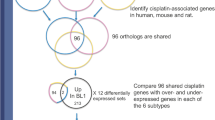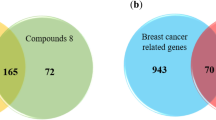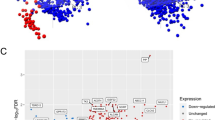Abstract
Background
Anticancer genes are an endogenous defense against transformed cells as they impose antineoplastic effects upon ectopic expression. Profiling the expression of these genes is fundamental for exploring their prognostic and therapeutic relevance in cancers. Natural compounds can upregulate anticancer genes in malignant cells and thus be useful for therapeutic purposes. In this study, we identified the expression levels of anticancer genes in breast cancer clinical isolates. In addition, the purified and sequenced plant protein (riproximin) was evaluated for its potential to induce anticancer genes in two breast cancer cell lines.
Methodology
Expression profiles of three anticancer genes (NOXA, PAR-4, TRAIL) were identified by immunohistochemistry in 45 breast cancer clinical isolates. Breast cancer cells were exposed to riproximin and expression of the anticancer genes was determined by microarray, real-time PCR and western blot methodologies. Lastly, a bioinformatic approach was adopted to highlight the molecular/functional significance of the anticancer genes.
Results
NOXA expression was evenly de-regulated among the clinical isolates, while PAR-4 was significantly down-regulated in majority of the breast cancer tissues. In contrast, TRAIL expression was increased in most of the clinical samples. Expression levels of the anticancer genes followed a distinct trend in accordance with the disease severity. Riproximin showed a substantial potential of inducing expression of the anticancer genes in breast cancer cells at transcriptomic and protein levels. The bioinformatic approach revealed involvement of anticancer genes in multiple cellular functions and signaling cascades.
Conclusion
Anticancer genes were de-regulated and showed discrete expression patterns in breast cancer patient samples. Riproximin effectively induced the expression of selected anticancer genes in breast cancer cells.




Similar content being viewed by others
Data availability
The datasets generated during the current study are available from the corresponding author upon reasonable request.
References
Grimm S, Noteborn M (2010) Anticancer genes: inducers of tumour-specific cell death signalling. Trends Mol Med 16(2):88–96. https://doi.org/10.1016/j.molmed.2009.12.002
Bruno P, Brinkmann CR, Boulanger MC, Flinterman M, Klanrit P, Landry MC, Portsmouth D, Borst J, Tavassoli M, Noteborn M, Backendorf C, Zimmerman RM (2009) Family at last: highlights of the first international meeting on proteins killing tumour cells. Cell Death Differ 16(1):184–186. https://doi.org/10.1038/cdd.2008.164
Thayyullathil F, Cheratta AR, Pallichankandy S, Subburayan K, Tariq S, Rangnekar VM, Galadari S (2020) Par-4 regulates autophagic cell death in human cancer cells via upregulating p53 and BNIP3. Biochim Biophys Acta Mol Cell Res 1867(7):118692. https://doi.org/10.1016/j.bbamcr.2020.118692
Rahman M, Davis SR, Pumphrey JG, Bao J, Nau MM, Meltzer PS, Lipkowitz S (2009) TRAIL induces apoptosis in triple-negative breast cancer cells with a mesenchymal phenotype. Breast Cancer Res Treat 113(2):217–230. https://doi.org/10.1007/s10549-008-9924-5
Cano-Gonzalez A, Mauro-Lizcano M, Iglesias-Serret D, Gil J, Lopez-Rivas A (2018) Involvement of both caspase-8 and noxa-activated pathways in endoplasmic reticulum stress-induced apoptosis in triple-negative breast tumor cells. Cell Death Dis 9(2):134. https://doi.org/10.1038/s41419-017-0164-7
Roufayel R, Younes K, Al-Sabi A, Murshid N (2022) BH3-only proteins Noxa and Puma are key regulators of Induced apoptosis. Life (Basel). https://doi.org/10.3390/life12020256
Ghosalkar J, Sonawane V, Pisal T, Achrekar S, Pujari R, Chugh A, Shastry P, Joshi K (2022) Prostate apoptosis response-4 (Par-4): a novel target in pyronaridine-induced apoptosis in glioblastoma (GBM) cells. Cancers (Basel). https://doi.org/10.3390/cancers14133198
Karbon G, Haschka MD, Hackl H, Soratroi C, Rocamora-Reverte L, Parson W, Fiegl H, Villunger A (2021) The BH3-only protein NOXA serves as an independent predictor of breast cancer patient survival and defines susceptibility to microtubule targeting agents. Cell Death Dis 12(12):1151. https://doi.org/10.1038/s41419-021-04415-y
Montero J, Gstalder C, Kim DJ, Sadowicz D, Miles W, Manos M, Cidado JR, Paul Secrist J, Tron AE, Flaherty K, Stephen Hodi F, Yoon CH, Letai A, Fisher DE, Haq R (2019) Destabilization of NOXA mRNA as a common resistance mechanism to targeted therapies. Nat Commun 10(1):5157. https://doi.org/10.1038/s41467-019-12477-y
Nagai MA, Gerhard R, Salaorni S, Fregnani JH, Nonogaki S, Netto MM, Soares FA (2010) Down-regulation of the candidate tumor suppressor gene PAR-4 is associated with poor prognosis in breast cancer. Int J Oncol 37(1):41–49. https://doi.org/10.3892/ijo_00000651
Mabe NW, Fox DB, Lupo R, Decker AE, Phelps SN, Thompson JW, Alvarez JV (2018) Epigenetic silencing of tumor suppressor Par-4 promotes chemoresistance in recurrent breast cancer. J Clin Invest 128(10):4413–4428. https://doi.org/10.1172/JCI99481
Mendez-Lopez LF, Zapata-Benavides P, Zavala-Pompa A, Aguado-Barrera ME, Pacheco-Calleros J, Rodriguez-Padilla C, Cerda-Flores RM, Cortes-Gutierrez EI, Davila-Rodriguez MI (2010) Immunohistochemical analysis of prostate apoptosis response-4 (Par-4) in mexican women with breast cancer: a preliminary study. Arch Med Res 41(4):261–268. https://doi.org/10.1016/j.arcmed.2010.05.005
Lagadec C, Adriaenssens E, Toillon RA, Chopin V, Romon R, Van Coppenolle F, Hondermarck H, Le Bourhis X (2008) Tamoxifen and TRAIL synergistically induce apoptosis in breast cancer cells. Oncogene 27(10):1472–1477. https://doi.org/10.1038/sj.onc.1210749
Yin S, Xu L, Bandyopadhyay S, Sethi S, Reddy KB (2011) Cisplatin and TRAIL enhance breast cancer stem cell death. Int J Oncol 39(4):891–898. https://doi.org/10.3892/ijo.2011.1085
Ganten TM, Sykora J, Koschny R, Batke E, Aulmann S, Mansmann U, Stremmel W, Sinn HP, Walczak H (2009) Prognostic significance of tumour necrosis factor-related apoptosis-inducing ligand (TRAIL) receptor expression in patients with breast cancer. J Mol Med (Berl) 87(10):995–1007. https://doi.org/10.1007/s00109-009-0510-z
Montinaro A, Walczak H (2023) Harnessing TRAIL-induced cell death for cancer therapy: a long walk with thrilling discoveries. Cell Death Differ 30(2):237–249. https://doi.org/10.1038/s41418-022-01059-z
Di Cristofano F, George A, Tajiknia V, Ghandali M, Wu L, Zhang Y, Srinivasan P, Strandberg J, Hahn M, Sanchez Sevilla Uruchurtu A, Seyhan AA, Carneiro BA, Zhou L, Huntington KE, El-Deiry WS (2023) Therapeutic targeting of TRAIL death receptors. Biochem Soc Trans 51(1):57–70. https://doi.org/10.1042/BST20220098
Thapa B, Kc R, Uludag H (2020) TRAIL therapy and prospective developments for cancer treatment. J Control Release 326:335–349. https://doi.org/10.1016/j.jconrel.2020.07.013
Suzuki S, Nakasato M, Shibue T, Koshima I, Taniguchi T (2009) Therapeutic potential of proapoptotic molecule Noxa in the selective elimination of tumor cells. Cancer Sci 100(4):759–769. https://doi.org/10.1111/j.1349-7006.2009.01096.x
Adwan H, Bayer H, Pervaiz A, Sagini M, Berger MR (2014) Riproximin is a recently discovered type II ribosome inactivating protein with potential for treating cancer. Biotechnol Adv 32(6):1077–1090. https://doi.org/10.1016/j.biotechadv.2014.03.008
Voss C, Eyol E, Frank M, von der Lieth CW, Berger MR (2006) Identification and characterization of riproximin, a new type II ribosome-inactivating protein with antineoplastic activity from Ximenia americana. FASEB J 20(8):1194–1196. https://doi.org/10.1096/fj.05-5231fje
Voss C, Eyol E, Berger MR (2006) Identification of potent anticancer activity in Ximenia americana aqueous extracts used by African traditional medicine. Toxicol Appl Pharmacol 211(3):177–187. https://doi.org/10.1016/j.taap.2005.05.016
Bolognesi A, Bortolotti M, Maiello S, Battelli MG, Polito L (2016) Ribosome-inactivating proteins from plants: a historical overview. Molecules. https://doi.org/10.3390/molecules21121627
Citores L, Ferreras JM (2023) Biological activities of ribosome-inactivating proteins. Toxins (Basel). https://doi.org/10.3390/toxins15010035
Bayer H, Essig K, Stanzel S, Frank M, Gildersleeve JC, Berger MR, Voss C (2012) Evaluation of riproximin binding properties reveals a novel mechanism for cellular targeting. J Biol Chem 287(43):35873–35886. https://doi.org/10.1074/jbc.M112.368548
Sagini MN, Klika KD, Orry A, Zepp M, Mutiso J, Berger MR (2020) Riproximin exhibits diversity in sugar binding, and modulates some metastasis-related proteins with lectin like properties in pancreatic ductal adenocarcinoma. Front Pharmacol 11:549804. https://doi.org/10.3389/fphar.2020.549804
Sharma A, Gupta S, Sharma NR, Paul K (2023) Expanding role of ribosome-inactivating proteins: from toxins to therapeutics. IUBMB Life 75(2):82–96. https://doi.org/10.1002/iub.2675
Horrix C, Raviv Z, Flescher E, Voss C, Berger MR (2011) Plant ribosome-inactivating proteins type II induce the unfolded protein response in human cancer cells. Cell Mol Life Sci 68(7):1269–1281. https://doi.org/10.1007/s00018-010-0524-2
Bayer H, Ey N, Wattenberg A, Voss C, Berger MR (2012) Purification and characterization of riproximin from Ximenia americana fruit kernels. Protein Expr Purif 82(1):97–105. https://doi.org/10.1016/j.pep.2011.11.018
Adwan H, Murtaja A, Kadhim Al-Taee K, Pervaiz A, Hielscher T, Berger MR (2014) Riproximin’s activity depends on gene expression and sensitizes PDAC cells to TRAIL. Cancer Biol Ther 15(9):1185–1197. https://doi.org/10.4161/cbt.29503
Pervaiz A, Adwan H, Berger MR (2015) Riproximin: a type II ribosome inactivating protein with anti-neoplastic potential induces IL24/MDA-7 and GADD genes in colorectal cancer cell lines. Int J Oncol 47(3):981–990. https://doi.org/10.3892/ijo.2015.3073
Pervaiz A, Zepp M, Adwan H, Berger MR (2016) Riproximin modulates multiple signaling cascades leading to cytostatic and apoptotic effects in human breast cancer cells. J Cancer Res Clin Oncol 142(1):135–147. https://doi.org/10.1007/s00432-015-2013-3
Murtaja A, Eyol E, Xiaoqi J, Berger MR, Adwan H (2018) The ribosome inhibiting protein riproximin shows antineoplastic activity in experimental pancreatic cancer liver metastasis. Oncol Lett 15(2):1441–1448. https://doi.org/10.3892/ol.2017.7526
Bansal C, Singh US, Misra S, Sharma KL, Tiwari V, Srivastava AN (2012) Comparative evaluation of the modified Scarff-Bloom-Richardson grading system on breast carcinoma aspirates and histopathology. Cytojournal 9:4. https://doi.org/10.4103/1742-6413.92550
Sinicrope FA, Rego RL, Okumura K, Foster NR, O’Connell MJ, Sargent DJ, Windschitl HE (2008) Prognostic impact of bim, puma, and noxa expression in human colon carcinomas. Clin Cancer Res 14(18):5810–5818. https://doi.org/10.1158/1078-0432.CCR-07-5202
Bilski A, Pasz-Walczak G, Kubiak R, Sek P, Chalubinska J, Fendler W, Wronski K, Piekarska A, Pluta P, Potemski P, Jeziorski A, Piekarski J (2010) TRAIL protein expression in breast cancer cells correlates with nuclear grade. Arch Med Sci 6(4):545–551. https://doi.org/10.5114/aoms.2010.14466
Mohammed H, Russell IA, Stark R, Rueda OM, Hickey TE, Tarulli GA, Serandour AA, Birrell SN, Bruna A, Saadi A, Menon S, Hadfield J, Pugh M, Raj GV, Brown GD, D’Santos C, Robinson JL, Silva G, Launchbury R, Perou CM, Stingl J, Caldas C, Tilley WD, Carroll JS (2015) Progesterone receptor modulates ERalpha action in breast cancer. Nature 523(7560):313–317. https://doi.org/10.1038/nature14583
Mohammed ZM, Going JJ, McMillan DC, Orange C, Mallon E, Doughty JC, Edwards J (2012) Comparison of visual and automated assessment of HER2 status and their impact on outcome in primary operable invasive ductal breast cancer. Histopathology 61(4):675–684. https://doi.org/10.1111/j.1365-2559.2012.04280.x
Guo H, Treude F, Kramer OH, Luscher B, Hartkamp J (2019) PAR-4 overcomes chemo-resistance in breast cancer cells by antagonizing cIAP1. Sci Rep 9(1):8755. https://doi.org/10.1038/s41598-019-45209-9
Alvarez JV, Pan TC, Ruth J, Feng Y, Zhou A, Pant D, Grimley JS, Wandless TJ, Demichele A, Investigators IST, Chodosh LA (2013) Par-4 downregulation promotes breast cancer recurrence by preventing multinucleation following targeted therapy. Cancer Cell 24(1):30–44. https://doi.org/10.1016/j.ccr.2013.05.007
Jyotsana N, Zhang Z, Himmel LE, Yu F, King MR (2019) Minimal dosing of leukocyte targeting TRAIL decreases triple-negative breast cancer metastasis following tumor resection. Sci Adv 5(7):eaaw4197. https://doi.org/10.1126/sciadv.aaw4197
Jeong S, Yun HK, Jeong YA, Jo MJ, Kang SH, Kim JL, Kim DY, Park SH, Kim BR, Na YJ, Lee SI, Kim HD, Kim DH, Oh SC, Lee DH (2019) Cannabidiol-induced apoptosis is mediated by activation of Noxa in human colorectal cancer cells. Cancer Lett 447:12–23. https://doi.org/10.1016/j.canlet.2019.01.011
Jin HR, Liao Y, Li X, Zhang Z, Zhao J, Wang CZ, Huang WH, Li SP, Yuan CS, Du W (2014) Anticancer compound Oplopantriol A kills cancer cells through inducing ER stress and BH3 proteins Bim and Noxa. Cell Death Dis 5:e1190. https://doi.org/10.1038/cddis.2014.169
Jeong YA, Kim BR, Kim DY, Jeong S, Na YJ, Kim JL, Yun HK, Kim BG, Park SH, Jo MJ, Lee SI, Han BC, Lee DH, Oh SC (2019) Korean red ginseng extract increases apoptosis by activation of the Noxa pathway in colorectal cancer. Nutrients. https://doi.org/10.3390/nu11092026
Zhao Q, Cheng X, Yu W, Bi Y, Guo J, Ma Q, Gong Y, He L, Yu X (2021) Pristimerin induces apoptosis and tumor inhibition of oral squamous cell carcinoma through activating ROS-dependent ER stress/Noxa pathway. Phytomedicine 92:153723. https://doi.org/10.1016/j.phymed.2021.153723
Burikhanov R, Hebbar N, Noothi SK, Shukla N, Sledziona J, Araujo N, Kudrimoti M, Wang QJ, Watt DS, Welch DR, Maranchie J, Harada A, Rangnekar VM (2017) Chloroquine-inducible Par-4 secretion is essential for tumor cell apoptosis and inhibition of metastasis. Cell Rep 18(2):508–519. https://doi.org/10.1016/j.celrep.2016.12.051
de Virgilio M, Lombardi A, Caliandro R, Fabbrini MS (2010) Ribosome-inactivating proteins: from plant defense to tumor attack. Toxins (Basel) 2(11):2699–2737. https://doi.org/10.3390/toxins2112699
Pervaiz A, Saleem T, Kanwal K, Raza SM, Iqbal S, Zepp M, Georges RB, Berger MR (2022) Expression profiling of anticancer genes in colorectal cancer patients and their in vitro induction by riproximin, a ribosomal inactivating plant protein. J Cancer Res Clin Oncol. https://doi.org/10.1007/s00432-022-04410-6
Funding
No specific funding was acquired for this research work.
Author information
Authors and Affiliations
Contributions
AP conceived this study, supervised/analysed the experiments and wrote the manuscript draft. NN supervised clinical sampling/immunohistochemistry and drafted the relevant findings. TS, IS, KK and OS helped in transcriptomic expression profiling and preparation of figures. SMR performed the bioinformatic analysis of this study. SI, FS and BI provided the support in western blot analysis. MRB facilitated the microarray experiments and also supervised the drafting/editing of the manuscript.
Corresponding author
Ethics declarations
Conflict of interest
The authors declare that they have no conflict of interest.
Ethical approval
For clinical investigations, informed consent was obtained from all patients and the study was conducted in accordance with the guidelines of the Ethics Review Committee of the University of Health Sciences, Lahore, Pakistan. Furthermore, the procedures performed were in accordance with the ethical standards of the institutional and with the 1964 Helsinki declaration and its later amendmentsor comparable ethical standards.
Additional information
Publisher’s Note
Springer Nature remains neutral with regard to jurisdictional claims in published maps and institutional affiliations.
Rights and permissions
Springer Nature or its licensor (e.g. a society or other partner) holds exclusive rights to this article under a publishing agreement with the author(s) or other rightsholder(s); author self-archiving of the accepted manuscript version of this article is solely governed by the terms of such publishing agreement and applicable law.
About this article
Cite this article
Pervaiz, A., Naseem, N., Saleem, T. et al. Anticancer genes (NOXA, PAR-4, TRAIL) are de-regulated in breast cancer patients and can be targeted by using a ribosomal inactivating plant protein (riproximin). Mol Biol Rep 50, 5209–5221 (2023). https://doi.org/10.1007/s11033-023-08477-3
Received:
Accepted:
Published:
Issue Date:
DOI: https://doi.org/10.1007/s11033-023-08477-3




